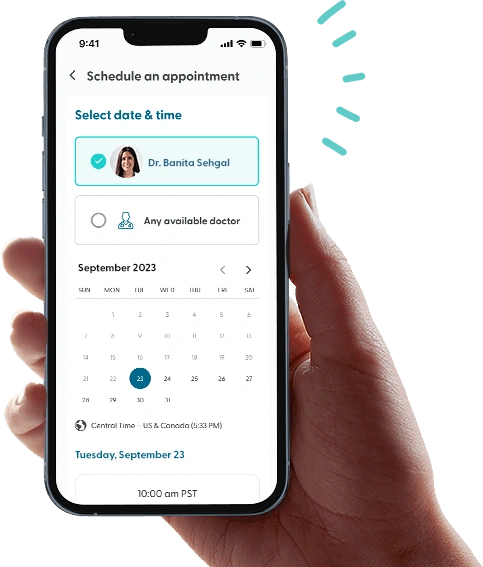An Essential Guide to Whole Carbs vs. Refined Carbs
Following a healthy and balanced diet often starts with understanding the role of different nutrients in the food we eat.
Nutrients like carbs are frequently associated with negative health implications, but it’s important to include carbohydrate-rich foods in our diet.
When it comes to incorporating carbs into your meals, understanding the difference between whole and refined options can help you make healthy choices.
In this article, we’ll guide you through understanding these differences and how to include the right carbs in your diet for optimal health and well-being.
Get prescription weight loss medication online.
Find out if you're eligible for GLP-1s, and get started on your weight loss journey.


An Overview of Whole Carbs
Understanding whole carbs
Whole carbs refer to foods in their natural, unprocessed state. Rich in fiber, vitamins, and minerals, these carbs are essential to a balanced and healthy diet.
Because whole carbs have been minimally processed, they have a lower glycemic index (GI).
This means that the body absorbs whole carbs more slowly, allowing for a more sustained energy release.
Sources of whole carbs
Whole carbs are primarily found in:
Whole grain foods, like brown rice, barley, and quinoa
Whole wheat bread
Fruits and vegetables, whether fresh, frozen, or dried
Legumes like beans, lentils, and peas
Nuts and seeds
These foods are also packed with other nutrients — including B vitamins, iron, magnesium, and healthy fats — that are essential for your overall well-being.
What are the health benefits of whole carbs?
Improved blood sugar control
Whole carbs have a positive effect on blood sugar control due to their high fiber content and low GI.
Remember that foods with a low GI are digested and absorbed more slowly, leading to a gradual increase in blood sugar levels.
This steady release of energy from whole carbs maintains consistent blood sugar levels, crucial for sustained energy.
The fiber in these carbs regulates blood sugar by slowing sugar absorption, preventing glucose spikes.
Over time, frequent spikes in your blood sugar can increase your risk of developing conditions like type 2 diabetes and obesity.
High blood sugar spikes also contribute to fluctuating energy levels throughout the day. This can affect your mood and focus, causing irritability and concentration difficulties.
Better digestive health
With their high dietary fiber content, whole carbohydrates can significantly improve your digestive health.
Fiber aids digestion by adding bulk to stools, facilitating smoother bowel movements, and preventing constipation.
Certain types of fiber also act as prebiotics, which support the beneficial bacteria in the gut.
This can improve gut health and contribute to a healthier microbiome that promotes better digestion.
Fiber not only enhances digestion but also promotes satiety, aiding in appetite control and reducing calorie intake for improved weight management.
Reduced risk of chronic diseases
Including whole carbs in your diet may be associated with a reduced risk of developing several chronic diseases. These may include:
Heart disease: Whole carbs can boost heart health by lowering risk factors such as high blood pressure and cholesterol. The fiber in whole carbs helps reduce bad cholesterol, while the variety of nutrients and phytochemicals can decrease inflammation.
Type 2 diabetes: The low GI of whole carbs and their fiber content can help keep blood sugar levels and insulin sensitivity in check, reducing the risk of type 2 diabetes.
Certain cancers: Dietary fiber — particularly from whole grains and vegetables — is associated with a reduced risk of some cancers. Whole carbs are also high in antioxidants that can protect cells from damage and abnormal mutations.
Obesity: Whole carbs can promote satiety and reduce overall calorie intake, which is beneficial for weight management and lowering obesity risk. Their nutrient density also means you get more vitamins and minerals to support your overall health.
Understanding Refined Carbs
What are refined carbs?
Refined carbs are grain products that have undergone processing to remove nutrients like bran and germ.
This processing removes fiber, vitamins, minerals, and other beneficial compounds, leaving refined carbs much lower in nutritional value than their whole counterparts.
Refined carbs also have a high GI, meaning they are digested and absorbed quickly. This can lead to rapid spikes in blood sugar, which can cause various health implications over time.
Which foods are refined carbs?
Foods that are classified as refined carbs include:
Refined grains like white bread and pasta
Sugary cereals
White rice
Pastries and sweets
Sugary drinks like sodas and juices rich in high fructose corn syrup
These foods typically offer little to no nutritional value and are often high in added sugars and artificial flavors that can harm your health.
Health implications of eating too many refined carbs
Blood sugar spikes
Refined carbohydrates have a high GI, meaning they are rapidly digested and lead to quick spikes in blood glucose levels.
These spikes trigger the pancreas to release large amounts of insulin, helping cells absorb glucose from the bloodstream.
Over time, frequent blood sugar spikes can lead to insulin resistance — a condition where cells become less responsive to insulin — which increases your risk of type 2 diabetes.
The cycle of rapid spikes and drops in blood sugar levels can also result in energy crashes, mood swings, and increased cravings for sugary or refined carbohydrate foods.
Increased risk of chronic diseases
Excessive consumption of refined carbs has been linked to an increased risk of several chronic diseases beyond type 2 diabetes. These may include:
Heart disease: Diets high in refined carbohydrates can contribute to an increased risk of heart disease. This occurs as they raise triglyceride and "bad" LDL cholesterol levels while lowering “good” HDL cholesterol. Over time, this imbalance worsens your lipid profile, raising your risk of cardiovascular problems.
Metabolic syndrome: Metabolic syndrome develops when various conditions occur together, increasing your risk of heart disease, stroke, and diabetes. Signs of metabolic syndrome include high blood pressure, high blood sugar, excess body fat around the waist, and abnormal cholesterol levels.
Certain types of cancer: Some research suggests that diets high in refined carbs may be linked to an increased risk of certain cancers. This is because factors like high blood sugar levels, obesity, and inflammation — which are all associated with refined carb consumption — can cause cells to develop abnormally and form tumors.
Weight gain
Refined carbohydrates are often high in calories but low in fiber and nutrients.
Fiber keeps you fuller for longer, which helps to control appetite and reduce food intake.
Without this fiber, it's easy to consume more calories than you need, leading to weight gain.
The body stores excess glucose from refined carbs as fat — especially if there's an insulin resistance issue — which can further contribute to weight gain and obesity.
Ready to achieve your weight loss goals?
Shed pounds with GLP-1 medication prescribed online by licensed healthcare providers.


Tips for Eating More Whole Carbs
Eat more legumes
Legumes — like beans, lentils, and peas — are great carbohydrate-rich options that also provide a source of fiber and protein.
They are easy to incorporate into a variety of dishes, including soups, salads, stews, and wraps, to help you increase your intake of whole carbs.
Add whole carbs to your breakfast
Starting your day with a portion of whole carbs can help provide you with sustained energy and help you avoid midday slumps.
Popular whole-carb breakfast options include oatmeal and whole-grain cereals or breads. You can also enhance the nutritional value of these foods by topping them with:
Berries
Sliced bananas
Cottage cheese
Boiled eggs
Avocado
Starting your day with whole-carb breakfasts can help you feel fuller for longer, which prevents snacking in between meals that may lead to weight gain.
Snack on fruits and vegetables
If you’re feeling peckish, try choosing fruits and vegetables instead of reaching for processed snacks, like chips and candy.
Fruits and vegetables are packed with nutrients and can provide you with a natural boost of energy. You can also try:
Carrot sticks and bell pepper slices with hummus
Apples with peanut butter — keep the skin on the apple for an added boost of fiber!
Berries drizzled with honey
These snack alternatives are much healthier than refined options and can help you satisfy your cravings.
Use whole grains for baking
When baking at home, substitute refined carbs — like white flour — for whole options to enhance the nutritional value of your recipes.
You can replace regular flour with options like:
Whole wheat flour
Oat flour
Almond flour
If you’re baking with sugar, you can also try healthier alternatives like honey or pureed fruit that provide sweetness while improving the nutritional value of your baked goods.
Where Can You Learn More About Healthy Eating Habits?
If you’re looking for more information on healthy eating habits to help you lose weight and improve your health, LifeMD has got you covered.
A team of medical professionals can guide you toward healthier eating habits and better weight management — all from the comfort of your home.
Make an appointment with LifeMD to learn more about sustainable ways to manage your weight and take control of your health, today.
More articles like this
Feel better with LifeMD.
Your doctor is online and ready to see you.
Join LifeMD today and experience amazing healthcare, discounted labs and prescription medications... plus around-the-clock access to medical guidance.













